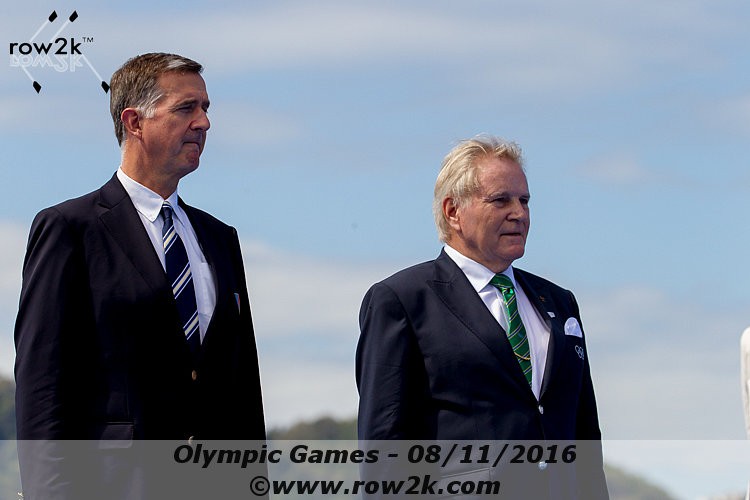Ed Moran, row2k.com

In reporting the story about the future status of international lightweight rowing, row2k sent FISA Executive Director Matt Smith a list of questions. Here is the transcript of the questions and Smith's responses.
Row2k: Looking at the history of lightweight rowing internationally, what were the driving factors that led to the addition of lightweights to the Olympic schedule and what happened over the years that resulted in the loss of the men's lightweight four after Rio?
Matt Smith: As you might know, back in 1993, I was FISA Development Director working to develop rowing around the world. That professional position was created by Denis Oswald in 1992 to respond to the challenge of universality which was IOC President Samaranch’s key priority for the Olympic Games at the time. And the perception of rowing back in those times were very tall and strong East Germans, Soviets and Germans winning all the rowing medals at the Games. Remember until the 1980s, wood boats and oars were still in use and rowing technique was - how can we say - not very scientific.
The perception in the developing world was that rowing was a closed shop for the very large body types. Denis Oswald understood that for rowing to keep a leading position in the Olympic Games, significant progress had to be made to convince countries with naturally smaller body types that there was a level playing field in rowing and they should take up rowing with its 14 Olympic medal events. The lightweight category was the key and this was what could convince the IOC that rowing was making progress. The change in the Olympic programme to include three lightweight events was put to a vote at the 1993 FISA Extraordinary Congress and needed a two-thirds majority to pass. It passed by one vote and rowing changed forever.
In the meantime, the rowing world evolved and the Olympic world evolved. The budgets for the teams have increased dramatically, as has the income and costs of staging the Olympic Games. Rowing has evolved in terms of investment by sports ministries, coaching quality, equipment quality, training subsidies for top athletes, and has attracted increasingly talented athletes.
The Olympic world evolved and a constant theme heard around Lausanne was why does rowing have a separate competition category where the time difference is only 1 or 2 percent and, mostly, the same countries were winning in open and lightweight categories. It created the perception that the lightweight category was a level playing field for the developing countries but, in particular for the four, to find four world class lightweight rowers was a very difficult challenge.
The competition for Olympic quota places among the 28 sports was and continues to be very intense. Our 124 (Rio) lightweight places are perceived as being unfair by the other sports and cause the IOC difficulty in justifying why rowing has this extra category.
Row2k: The reasoning behind the change has been stated to be a gender balance necessity. Did other factors - safety, popularity, competitive level - that play a role?
Matt Smith: The change between Rio and Tokyo was the change in leadership of the IOC (from Jacques Jean Marie Rogge to Thomas Bach) and massive changes in terms of challenges to find hosts and keep up interest in the Olympic Games.
One of the key agenda items for the IOC was to prove that the Olympic Games and the Olympic movement could cause change in society, and change in terms of the inequities in today’s society as a good reason for the Games, and as a good reason for a city to be motivated to stage the Games. And gender equality became a key priority for the IOC with the Tokyo 2020 Games programme.
So, yes, rowing, in order to keep in line with the priorities that the IOC had for the Olympic Games programme, had to change from a programme of 8 men and 6 women events to 7/7 men/women events. Another change in IOC Olympic Agenda 2020 was that each individual event was under the microscope in terms of “value proposition” for the Games. With a maximum of 310 events, all events were evaluated in terms of differentiation and interest by the host broadcasters, sponsors and in terms of spectator interest.
The IOC, having the pressure from the other sports on quota, questioned, in particular, the lightweight four as seemingly the same countries were winning both fours (hard to explain), the times were the same and sometimes the lightweight four was faster, etc. As one men’s event had to go, as far as our talks with key people at the IOC, the lightweight four was the event that was the most difficult to defend as being unique and different enough from the others.
Row2k: The lightweight eight was a popular and competitive international boat class and is now no longer on the international schedule. In talking to rowers and coaches, lightweight rowing was once thought as being a vital component in the growth of the sport among smaller countries that don’t have the size or resources to field a large team or a competitive heavyweight crew. Was that thinking incorrect?
Matt Smith: The lightweight eight was a popular boat class in the 1980s and 1990s, but has been removed from the World Championship programme due to a lack of participation. Rule 37 specifies that if, over three consecutive years, the entries for a World Championship event are less than seven, the event will be automatically removed from the World Championship programme.
The information we have is that most of the national teams are funded primarily by sports ministries and that funding is strongly linked to the Olympic boat classes. And, as we all know, staging training camps for eights and flying them to events along with accommodation and meals at events is costly. While in some countries there is a culture of “self-funding” for events that do not have national federation funding, this is limited to only a few countries. Thus, national federations were not getting funding for the non-Olympic boat classes and were dropping the lightweight eight in order to focus financing on their Olympic athletes and boat classes. I would say that this is the primary explanation I have heard around from the national federations.
Row2k: As you see things now, and looking past 2020, what do you think will happen with lightweight rowing as a boat class in international competition, both as a World Rowing Event and an Olympic event?
Matt Smith: You might not know that I coached lightweight men at UCLA for two years in a prior life and have strong memories of my teams back then. And one can see some fantastic local, regional and national competitions in lightweight categories, particularly in the English-speaking countries. The lightweight category was born in North America, as best we can find out. We have this information from rowing historian Stan Lapinski:
1915 (The First Regatta of the Canadian Association of Amateur Oarsmen – the regatta which became the Canadian Henley in 1903 – was held in 1880.) I checked my on-line records. http://goldmedalphotos.com/records/Gold-Medal-Photos--Records-by-Year.pdf and the earliest lightweight record is for the Junior Fours (140 lbs.) in 1906. If you search “140 lbs.” you will find the beginning (and end) dates for all the earliest lightweight races.
I have not come across any discussion regarding the choice of weight. My guess would be that some big club in Canada or the U.S. had too many men and came up with the idea of putting the smaller men into their own boat, and afterwards they decided that 140 lbs. was a nice round number, so they went with that.
At the U.S. collegiate level, it was an outstanding Canadian oarsman, Joe Wright, who, when coaching at the University of Pennsylvania, introduced lightweight rowing in 1917. His careers are well documented, so you may be able to find what was meant by “lightweight." My 1963 NAAO (predecessor to USRowing) Guide gives 1923 for the first Double Sculls – 150 lbs. Other 150 lb. events began in the years after 1923.
However, it is a different story in the rest of the world and lightweight sweep rowing is not as developed. Lightweight sculling is probably the most widely participated in category at this stage. At one point, it was one of my dreams that the lightweight eight race in Lucerne would become the unofficial world championships for this event, but it is even difficult to get entries there to keep it going.
So, I remain optimistic that the lightweight category is perfect for many countries to get more people motivated to try the sport and provide additional competition categories to keep them going. However, to finance preparation/selection camps and travel to international competition, it seems more and more difficult.
Row2k: If you stepped away from your role as a FISA official and just looked at lightweight rowing historically, what could have been done differently to have made lightweight rowing more successful overall; kept the boat classes more vital, or popular as fast, competitive, well subscribed events that could have served as a way to grow the sport in smaller countries?
Matt Smith: This is the big question we face currently. We have not succeeded in convincing people outside our sport that there is indeed a strong explanation for the lightweight category at the Olympic Games. We do not hide the fact that the IOC continue to question this category (the two doubles) and ask for strong and convincing arguments. We have not given up and still seek new ideas. Some ideas we have heard are to lower the weight. In fact, the lightweight weight was established in “developed”, western countries so there is not a lot of science behind it. When I was Development Director travelling around in Southeast Asia and Africa, it was a victory just to find a man who weighed 70 kilos.
So, one could say that the weights we have selected do not cater to development, and should do. As the open and lightweight doubles have the same boat weight, if we made the lightweight doubles boat lighter, they would go faster and defeat the purpose. Another suggestion we have received is to standardize the boat itself such that only lightweight people would fit in the boat, thus keeping two seats open for lightweights…but again a hard one to justify to people as the boat and race would still look exactly the same as other doubles.
Another suggestion was to base it on height, not weight, but when you dig into this, it is full of problems. In any case, we have not given up and we are spending 2018 listening to all possible ideas which could help us create a separate competition category in the Olympic programme.
If you enjoy and rely on row2k, we need your help to be able to keep doing all this. Though row2k sometimes looks like a big, outside-funded operation, it mainly runs on enthusiasm and grit. Help us keep it coming, thank you! Learn more.
Comments | Log in to comment |
- Bont Rowing
- Calm Waters Rowing
- Concept 2
- Craftsbury Sculling
- The Crew Classic
- CrewLAB
- Croker
- Durham Boat Co.
- Empacher
- Faster Masters
- Filippi
- Fluidesign
- h2row.net
- HUDSON
- Live2Row Studios
- Nielsen-Kellerman
- Oak Ridge RA
- Peinert Boat Works
- Pocock Racing Shells
- Race1 USA
- RowKraft
- Rubini Jewelers
- Vespoli USA
- WinTech Racing
- Bont Rowing
- Calm Waters Rowing
- Concept 2
- Craftsbury Sculling
- The Crew Classic
- CrewLAB
- Croker
- Durham Boat Co.
- Empacher
- Faster Masters
- Filippi
- Fluidesign
- h2row.net
- HUDSON
- Live2Row Studios
- Nielsen-Kellerman
- Oak Ridge RA
- Peinert Boat Works
- Pocock Racing Shells
- Race1 USA
- RowKraft
- Rubini Jewelers
- Vespoli USA
- WinTech Racing


















08/03/2018 8:53:20 AM